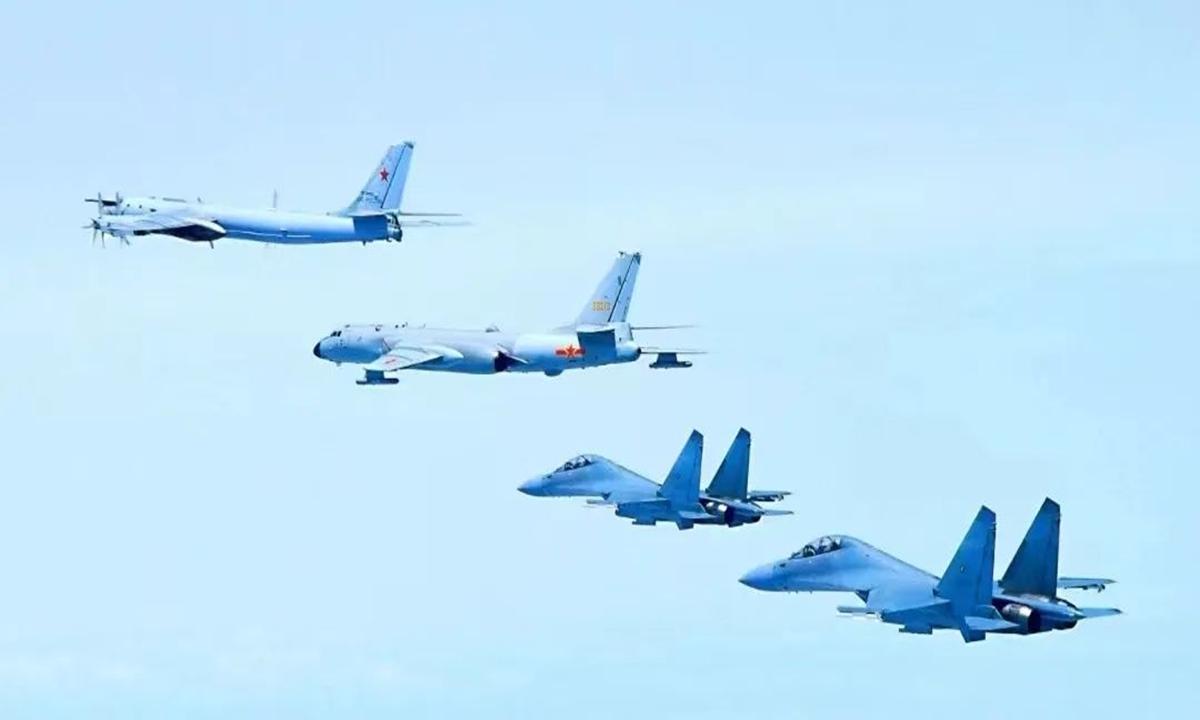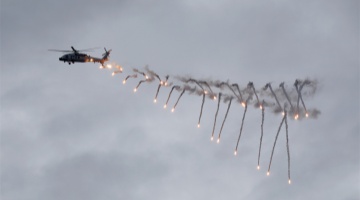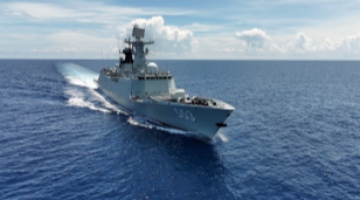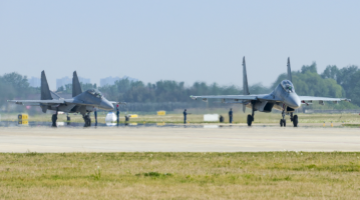
Two Chinese J-16 fighter jets conduct an escort mission for a Chinese H-6K bomber and a Russian Tu-95MS bomber during a regular China-Russia joint strategic patrol above the Sea of Japan, the East China Sea and the West Pacific on May 24, 2022. Photo: Screenshot from China Central Television
The Chinese and Russian militaries on Thursday conducted a joint strategic aerial patrol over the Bering Sea. The operation aimed to test and enhance coordination between the two air forces, and to deepen the strategic mutual trust and practical cooperation between the two countries. This also marked the first time Chinese bombers flew near Alaska. On the same day, the North American Aerospace Defense Command (NORAD) issued a statement saying that the US and Canadian military aircraft "detected, tracked, and intercepted" the Chinese and Russian aircraft. A US senator also labeled the proximity of the Chinese and Russian aircraft to Alaska as an "unprecedented provocation." The Chinese Ministry of National Defense stated that the joint air strategic patrol in the relevant airspace of the Bering Sea was conducted according to the annual cooperation plan between the two militaries. The operation did not target any third party, it complied with international laws and practices, and was not related to any current international or regional situation.
The joint patrol of Chinese and Russian military aircraft in the relevant airspace of the international Bering Sea is fully compliant with international law and norms. The exercises were conducted in international airspace and is equal to the US position that military aircraft enjoy legal right of use of airspace under the United Nations Convention on the Law of the Sea (UNCLOS).
Prior to this, the Chinese Air Force and the Russian Aerospace Forces had organized seven joint air strategic patrols, effectively testing and enhancing the level of cooperation and joint operational capabilities of the two militaries, and achieving a "normalization" of cooperative drills in the Sea of Japan and the East China Sea. These strategic joint patrols have always been conducted without violating the airspace of other countries. Similarly, the recent joint patrol in the relevant airspace of the Bering Sea did not infringe on US or Canadian airspace, in line with relevant international practices, and was not worth the fuss.
Some people take the China-Russia strategic patrol as an "unprecedented provocation" against the US. This is clearly an overreaction. The nearest they went was still 200 nautical miles away from the US coast. In contrast, last year alone, US military aircraft came close to the airspace of the Chinese mainland and Hainan Island approximately 100 times, with most of those approaches being less than 30 nautical miles from the baseline of the territorial sea. If Chinese and Russian aircraft conducting lawful and reasonable patrols 200 nautical miles from the US in international airspace still causes the US and Canada to feel nervous and send fighter jets to "intercept" them under the guise of so-called national security, then what right do the US and its allies have to criticize China's legitimate and professional interceptions and expulsions when US military aircraft come as close as 30 nautical miles?
When it comes to "freedom of overflight," Washington has always practiced double standards. In recent years, the provocative activities of US military aircraft in the South China Sea and Taiwan Straits have become increasingly apparent. For instance, in December 2022, a US Navy P-8A anti-submarine patrol aircraft flew from north to south over the Taiwan Straits, coming within 13 nautical miles of China's territorial baseline, setting a new record for the closest reconnaissance by a US military aircraft against China. Washington seems to believe that only its own and its allies' ships and aircraft enjoy "freedom of navigation and overflight," allowing them to conduct close reconnaissance and other "peaceful" military activities in "international waters and airspace" near China's territorial waters and airspace. Meanwhile, Chinese naval and air force ships and aircraft, as a party to UNCLOS, are considered a "military threat" as soon as they go to sea. It is unclear where the US gets this absurd double standard.
This disproportionate tension from the US is a reflection of a hegemonic mind-set. It pays little regard to the security of others. The thousands of close reconnaissance missions and hundreds of targeted exercises conducted annually in the seas around China should not be considered normal under any circumstances, yet the US continues to increase these activities under the guise of the so-called Indo-Pacific Strategy and freedom of navigation. If the US is truly sensitive and anxious about security issues, it should seriously reflect on its own activities around China.









